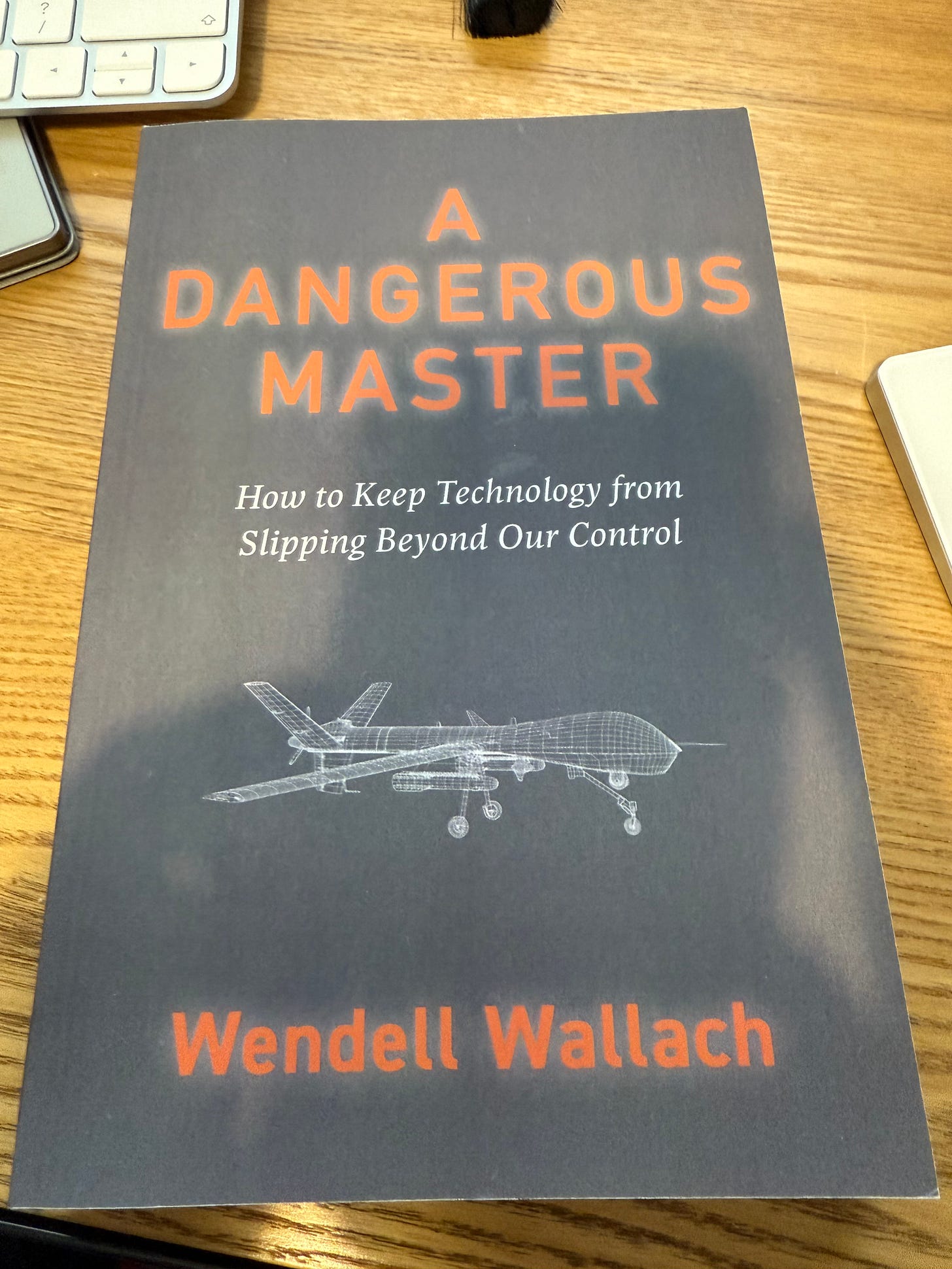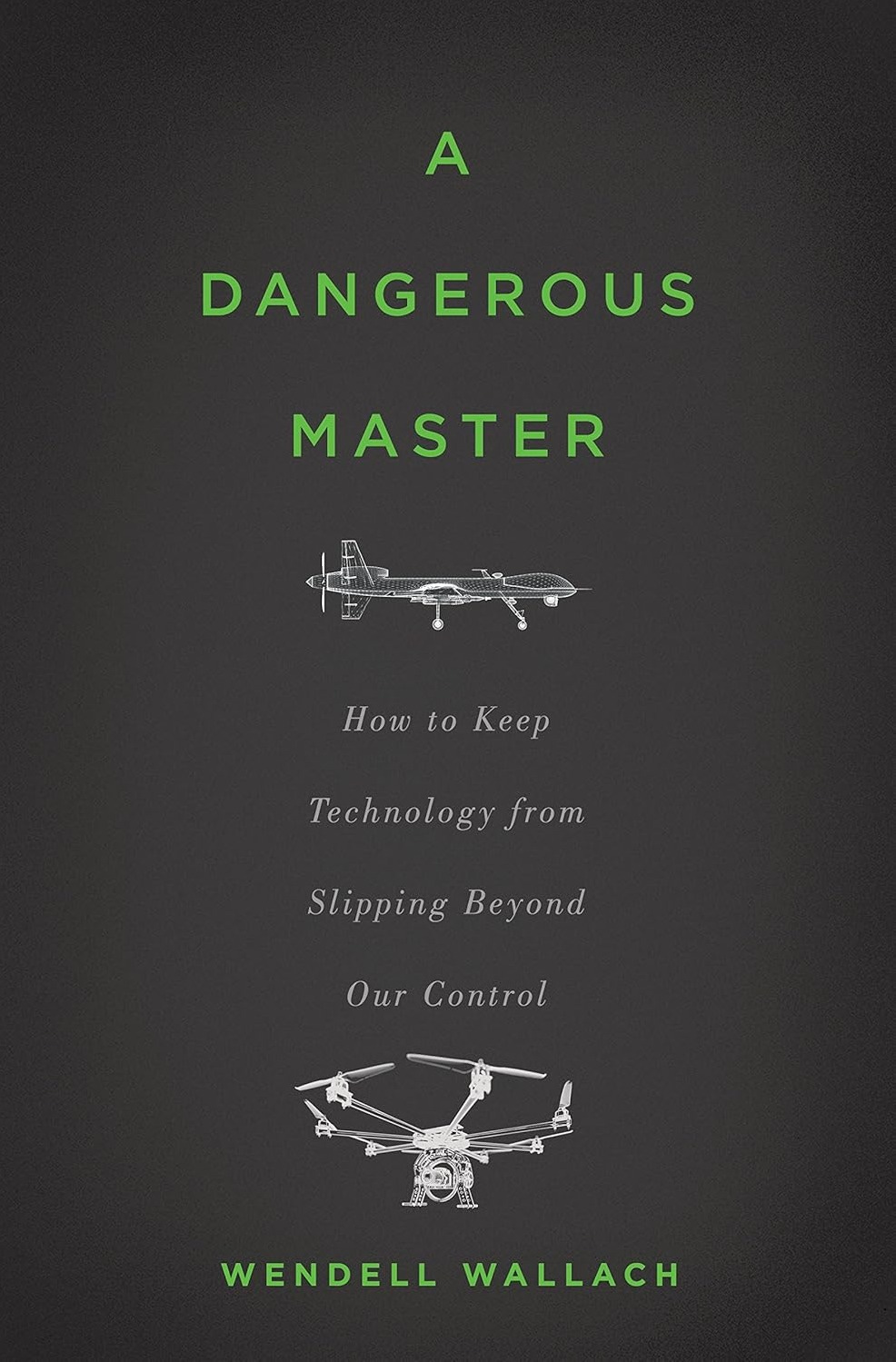Book Review: A Dangerous Master by Wendell Wallach
Not All Inventions Lead to a Better World
Some books you stumble across by chance. Others arrive when you are ready for them, whether you know it or not. A Dangerous Master by Wendell Wallach was the second kind for me. I did not pick it up expecting answers. I picked it up because somewhere, under the endless noise of tech optimism and innovation theatre, there was a gnawing sense that we were pushing too fast, too far, without asking what came next. Wallach does not offer neat resolutions. What he offers is something rarer: an honest reckoning with what it means to be human in an age where our creations might outstrip our ability to control them.
Elevator Pitch:
“A Dangerous Master is a wake-up call. Wendell Wallach shows how our race to invent new technologies has outpaced our ability to manage them. It is not a book of doom, but a warning that progress without foresight is no progress at all. It changed the way I think about responsibility, risk, and the future we are sleepwalking into. Everyone working in or around emerging tech should read it, and then ask themselves whether they are building a world they would want to live in.”
From the first few pages, I knew this would not be a comfortable read. Wallach sets the stage with calm precision. No panic. No grandstanding. Just a clear voice tracing the lines between promise and peril. He walks through the emerging technologies that are shaping the century. AI, synthetic biology, nanotech, cognitive enhancement. He refuses to let you sit back and imagine they will sort themselves out. They will not. That was the first real punch the book landed on me. There is no automatic happy ending. There is no guarantee that ingenuity will save us from ourselves.
“The genie is out of the bottle. We will not disinvent synthetic biology or general artificial intelligence.”
(A Dangerous Master, Wendell Wallach)
Wallach introduces the idea of technological inevitability and it has stayed with me. The belief that if something can be invented, it will be. That once it is invented, it will be used. It sounds obvious when you say it like that. Yet most of the narratives we are fed, the ones about AI transforming education, gene editing curing disease, quantum computing solving climate change, rely on the opposite assumption. That we will only use new powers wisely. That we will pause at the cliff edge. Wallach is not so sure. Neither, after reading him, am I.
The heart of the book is not about the technologies themselves. It is about the gap. The gap between what we can do and what we are ready to live with. The gap between the speed of invention and the lumbering, reactive systems we have built to govern ourselves. I found this section difficult to get through, not because the writing is heavy, but because the truth is. Wallach lays out, piece by piece, how our institutions are structurally incapable of keeping up. National governments move slowly. International agreements take decades. Corporations sprint ahead, driven by profit. Risk management has become a game of catch-up and the stakes are no longer financial. They are existential.
There is no easy villain in Wallach’s story. No single company, no rogue scientist, no reckless government you can point to and blame. The villain, if there is one, is us. Our impatience. Our arrogance. Our refusal to accept that some risks cannot be un-invented once they are unleashed. It is a quieter, deeper kind of indictment and it left me thinking about the ways I have, even unconsciously, been complicit in that cultural momentum.
“We have created a world where innovation is relentless, but the governance structures required to manage it are outdated, fragmented, and reactive.”
(A Dangerous Master, Wendell Wallach)
What I appreciated most is that Wallach does not slip into easy despair. He believes, however cautiously, that we are capable of learning. That ethical foresight, systematically applied, can change the trajectory. But he makes no promises. He knows that history does not guarantee wisdom. It was strangely comforting to feel that tension, hope but never certainty, woven through the book.
I will not pretend that every section landed equally for me. There were moments, especially when Wallach touched on global governance mechanisms, where I wanted more grit. I wanted him to be sharper about corporate capture, about the way powerful states sabotage global cooperation when it suits them. At times he pulls back from naming names, from pushing harder into the political realities. Maybe he judged that a more neutral tone would make the book more widely accessible. I am not sure. What I am sure of is that the restraint did not erase the power of the argument.
By the time I finished, I knew that the book had worked on me at a deeper level than most. It was not just that I agreed with Wallach’s concerns. It was that they had unsettled me enough to change what I now feel obligated to do.
Here are the learnings I took from A Dangerous Master, and what it has influenced me to do differently:
First, it shattered the illusion that ethics can be applied after the fact. I used to think that you could build something first, then bolt on governance, codes of conduct, safety nets. Now I see that by the time you are bolting, the damage is often already done. I have started to rethink every project, every idea, from the seed stage. Ethics first. Not last.
Second, it made me stop waiting for perfect governance structures to materialise. Waiting for regulation is no longer an excuse. If we know the risks, we have a duty to act, even when the frameworks are incomplete. I have started moving quicker, speaking louder, refusing to be reassured by vague promises of self-regulation in industries where history shows otherwise.
Third, it taught me that responsibility is not vertical. It is not something you pass upward to governments or downward to consumers. It is networked. It lives everywhere. That insight has changed how I think about influence. I no longer ask only what leaders are doing. I ask what I am doing, what we are all doing, to shape the culture around emerging tech.
Fourth, it reminded me that small victories matter. No single governance initiative will solve the problem. But every bit of friction we introduce, every pause, every debate, every set of ethical guardrails, can slow the momentum toward catastrophe. I have stopped thinking in terms of total solutions. I am thinking in terms of strategic friction.
In the wider landscape, Wallach’s voice deserves to be much louder. Compared to the more dramatic warnings of Nick Bostrom or the sharp systemic critiques of Cathy O’Neil, he offers something harder to categorise. A kind of practical ethics for a chaotic world. He is less concerned with predicting exactly how things will fall apart and more concerned with helping us realise how close we are to losing control, and how hard it will be to regain it once we do.
Reading it now, in a year when AI deployment feels less like a managed process and more like a stampede, Wallach’s warnings feel sharper than ever. He was right to point out that the real danger is not that we do not see the risks, but that we believe we can outrun them. We cannot. At best, we can only stay slightly ahead by thinking differently, by building systems that prioritise collective survival over individual gain.
There is no tidy way to end a reflection like this. Wallach would not want one. He does not pretend that solutions will come neatly packaged. He knows that the work ahead will be messy, painful, full of false starts and uncomfortable compromises. But he insists it is work worth doing.
I closed A Dangerous Master feeling heavier, but also somehow clearer. Clarity is not the same as comfort. Clarity is knowing exactly what is at stake and still choosing to fight for a future that will never be guaranteed, but might still be possible.




